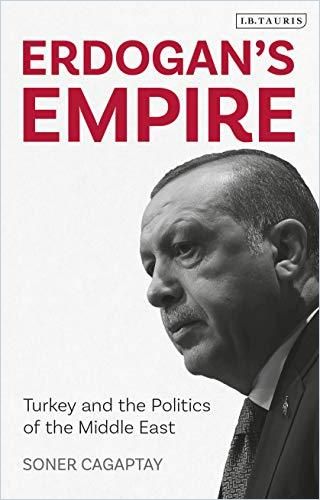Political scientist Soner Cagaptay details Recep Tayyip Erdoğan’s rise to power in Turkey and how his approach has changed that nation.

Turkey’s Strong Man
Political scientist Soner Cagaptay, a fellow and director of the Turkish Research Program at the Washington Institute, details the policies of Turkish leader Recep Tayyip Erdoğan. Though Erdoğan plays to populist prejudices and opposes religious freedom, Cagaptay says he hasn’t entirely dismantled Turkey’s democracy. Moreover, the author shows how Erdoğan has presided over an economic boom and countered Bashar al-Assad’s bloody practices in Syria.
Reviewers appreciated the complexity of Cagaptay’s approach and his attempts to explain Turkey to those who know little about it. The Washington Post, for example, wrote, “Americans, Israelis and Europeans may not like the headstrong, ruthless Erdoğan, but after reading Cagaptay’s book, they’ll at least understand him.” Ozdem Sanberk, former undersecretary at the Turkish Foreign Ministry, called this book a “must-read for citizens around the globe.”
Recep Tayyip Erdoğan
Cagaptay contextualizes Erdoğan in Turkish history by relating how the Ottoman Empire collapsed during World War I and how, in the 1920s, Turkish field marshal Mustafa Kemal Ataturk established the modern Turkish state as a secular, European-style democracy.
Nations that were once great empires, such as Turkey, often have an inflated sense of their heyday.Soner Cagaptay
Cagaptay shows how Erdoğan transformed Turkey into a socially conservative Islamic republic that views itself as part of the Middle East, not Europe.
Cagaptay cites Erdoğan’s silencing opponents through arrests and tax audits. The author makes a not-entirely convincing argument that Turkey remains a democracy, with half the populace opposing Erdoğan. Given Erdoğan’s iron grip on the media and his suppression of any critics, outsiders might see the trappings of democracy but not the reality.
So long as Turkey is genuinely democratic, Erdoğan cannot complete his revolution. Soner Cagaptay
His supporters, the author notes, believe Erdoğan restored religious pride among Turkey’s Muslims while standing up to Western forces that would marginalize and humiliate them. In 2002, for example, the George H.W. Bush administration asked Erdoğan to support its war against Iraq’s Saddam Hussein. Cagaptay relates the pressure this placed on Erdoğan: Turkish voters opposed the invasion, while Turkey’s generals stayed on the sidelines, hoping Erdoğan would fail.
The author admires Erdoğan’s subsequent moves: The Turkish leader avoided helping the United States through parlimentary maneuvering. Erdoğan did, Cagaptay notes, grant the US military the right to fly over Turkish airspace, but his harsh speeches spawned antagonism within Turkey toward the West and Israel.
Economic Force
Cagaptay paints a basic economic picture: With 82 million residents, Turkey is one of the largest nations in its region, and its economy is bigger than those of all its neighbors, except for Russia’s. Among European nations, only Germany, France, Great Britain and Italy have larger economies. The author makes special note that Turkey’s literacy rate approaches 100%.
No longer dwarfed by its neighbors, Turkey is now seeking to wield influence over its neighbors, many of them former Ottoman subjects.Soner Cagaptay
Turkey’s economic rise makes it a candidate for the European Union. Turks believe that pushback from the EU derives from Turkey being a Muslim nation, but Cagaptay posits that Erdoğan’s authoritarianism is the primary factor.
Cagaptay recounts a 2010 incident between Turkey and Israel that undermined Washington, DC’s relationship with Erdoğan: A flotilla of civilian ships sailed to Gaza to breach Israel’s blockade, but Israeli commandos intercepted the ships and killed 10 Turkish citizens.
At the onset of the Arab uprisings, Obama could not find a better possible model to promote than that presented in Erdoğan’s Turkey. Soner Cagaptay
As the Arab Spring began in 2010, Erdoğan preferred stable dictatorships to unstable democracies.
Bashar al-Assad
Cagaptay reveals that, when violence erupted in Syria, Erdoğan urged Assad not to kill civilians. Assad ignored him, and Erdoğan became Assad’s biggest enemy. Erdoğan began offering support and shelter to Syrian rebels.
Putin and Erdoğan share a mutual affinity as two leaders with authoritarian styles, who see themselves on a mission to make their nations great again.Soner Cagaptay
Cagaptay presents Erdoğan’s opposition to Assad as fomenting tension with Moscow. The author regards Vladimir Putin and Erdoğan, with their iron-fisted rules, as kindred spirits. Erdoğan had no choice, Cagaptay reveals, but to negotiate with Putin. Erdoğan regarded Turkey and Russia as peers, whereas Putin viewed Russia as a major power and Turkey as an also-ran.
Coup
In 2016, top-ranking officials from the Turkish Armed Forces tried to oust Erdoğan. Their attempted coup included a bombing in Ankara and nearly 300 deaths. The effort not only failed to kill or remove Erdoğan, Cagaptay relates, but it offended even Erdoğan’s detractors, who recoiled at the military running their nation. The event rekindled Erdoğan’s relationship with Putin; America’s tepid response stoked anti-US feelings in Ankara, a resentment that Putin exploited.
Future Paths
The author sees three potential Turkish futures: The country could try to go it alone, as Erdoğan plays the United States, the Middle East and Russia against each other; an economic downturn could bring open revolt; or a return to democratic principles could stop Turkey’s continuing brain drain.
Cagaptay maintains that only through embracing Western values can Turkey prosper. He calls on Erdoğan to grant equal rights to all citizens, including the Kurds, to protect religious minorities, and – though this seems a fantasy – to embrace a free press and freedom of information.
Cagaptay takes on a complex and multilayered subject that could pose hurdles for the author and his readers. Given his broad expertise, the author seems oddly reluctant to challenge Erdoğan’s worst behaviors. Cagaptay’s love for his country emerges in his wish for changes in Erdoğan’s policies and personality, which seem entirely unlikely. Still, Cagaptay provides an admirable overview that politicians, businesspeople, investors and students will welcome.
Soner Cagaptay is also the author of The New Sultan and Islam, Secularism and Nationalism in Modern Turkey. Other works examining Turkey’s leader include Hannah Lucinda Smith’s Erdoğan Rising and M. Hakan Yavuz’s Erdoğan.









